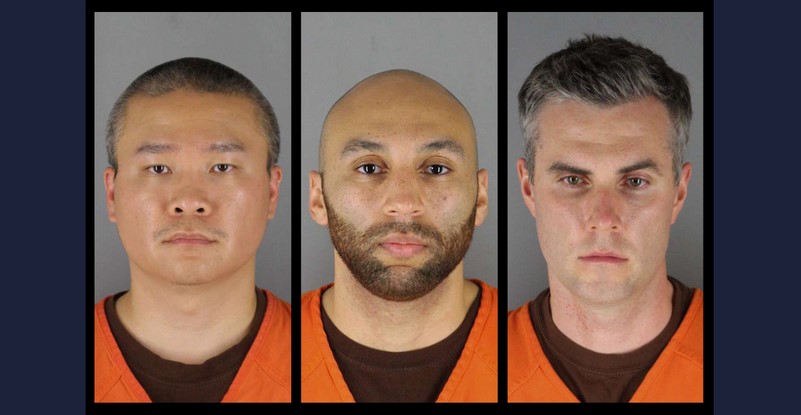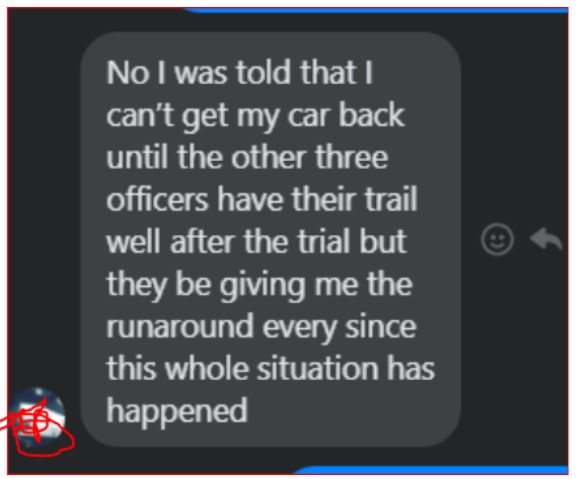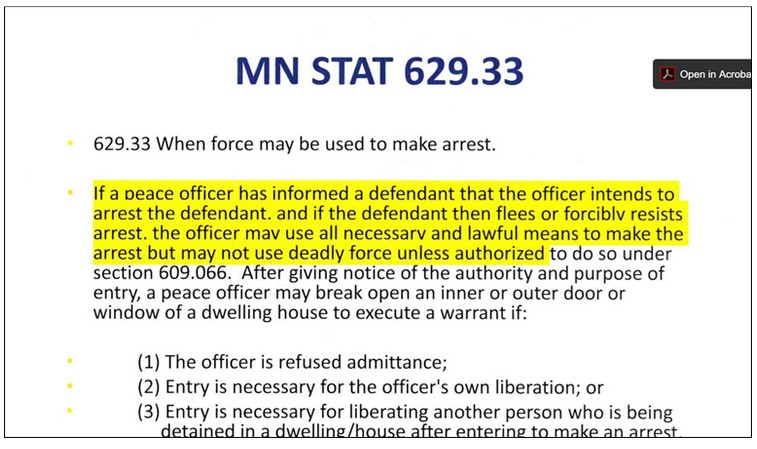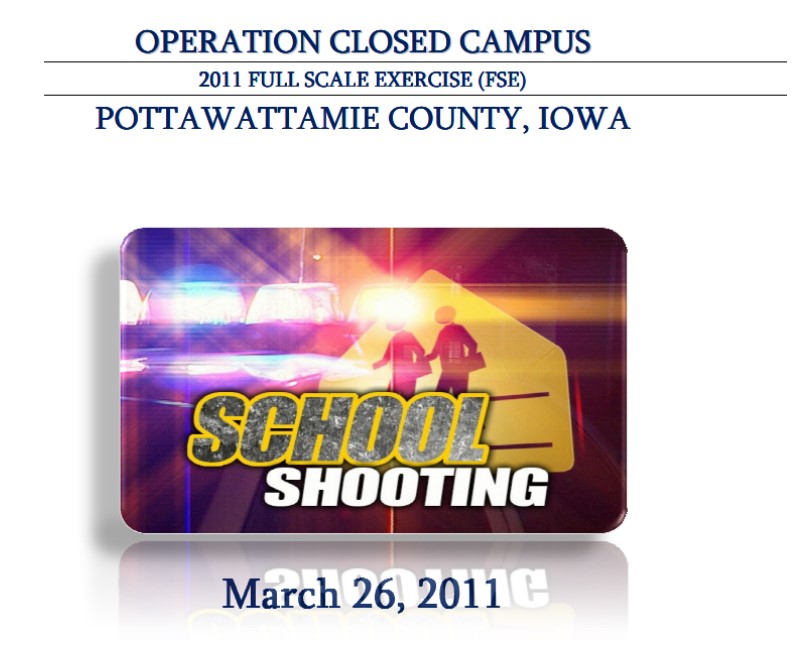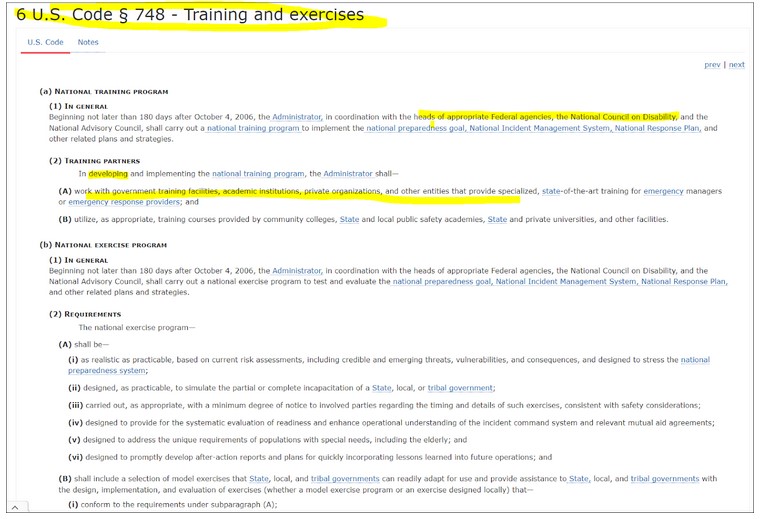The three former Minneapolis police officers – Alexander Kueng, Thomas Lane, and Tou Thao convicted in late February of depriving George Floyd of his constitutional rights, are demanding a new trial. In essence, the men convicted of violating Floyd’s rights are now saying prosecutors violated theirs.
The defense stated that the prosecutors elicited unfairly “duplicative evidence and cumulative testimony,” and violated a pretrial order by “eliciting emotional responses” and “speculation” from witnesses.
“The Government’s actions during this lawsuit stripped Mr. Thao of his constitutionally protected right to a fair and impartial trial due to repeated breaches of this Court’s pretrial orders, questions, and arguments that violated rules of criminal procedure and evidence, and unprofessionalism in front of the jury,” wrote his attorneys Robert M and Nathalie R. Paule.
Derek Chauvin was convicted of murder in a Minnesota state court back in April 2020. Another trial, this time criminal on the state level, is slated to begin for the three former officers on June 13 before Peter Cahill, the same judge who presided over Chauvin’s case. The three officers were tried on the federal level.
Please follow Maryam Henein on Twitter
You can support her work on Patreon
Follow Maryam on Telegram and Gab
“Combination Pizza Hut and Taco Bell” — Mixing Bad Drugs
“Cops are bad. If you don’t think these officers should go to jail, then I don’t want to talk to you anymore,” a sixty-something scriptwriting professor told me recently. We had just met. We’d been on the phone for a total of 24 minutes. His venomous reaction took me by surprise. I quickly changed the subject.
Consider that a police officer responding to a major incident has to juggle uncertainty about missing or conflicting information, manage high levels of risk – all while coping with time pressure.
Clearly, their emergency decision-making skills and uncertainty management strategies of these cops – two who were on the first week of the job – were a fail.
Keep in mind that as a consequence of this incident and the related trials thereafter, there has been an unprecedented state legislative response about policing.
U.S. District Judge Paul Magnuson, in his instructions to the jury before deliberations, instructed jurors that they must view the evidence in light of what a “reasonable officer at the scene” would have done “without the benefit of 20-20 hindsight.”
The defense conveyed to the jurors that police actions can be difficult to understand. They invited jurors to consider all the evidence, not just after the crowd had shown up.
It didn’t matter, a consensus reality had formed and mobs rule.
And, yes, many cops are bad. But were these cops “bad”? Should they pay for the transgressions of others or for an MPD academy training manual rife with inconsistencies?
In April 2021, the DOJ initiated a patterns and practices investigation into MPD that included training. The civil probe will assess whether the MPD engages in a pattern or practice of unconstitutional or unlawful policing, marking the first pattern-or-practice investigation under the Biden administration.
How about the fact that two of them – Lane and Kueng – were rookies on the third or fourth day of their job?
I personally could not say the defendants acted against their training or were guilty beyond a reasonable doubt of “willfully” failing to intervene.
“Instant and unquestioned obedience is demanded,” reads one part of the manual. And yet with a bit of bullying and spin, the prosecution stated, “Let’s be clear what this means … that it’s too much to expect police officers to save a man’s life if it means disrespecting a more senior officer.”
These former officers also had rights, which included the right to a fair trial. Yet the government and media were tweaking the truth and reframing the incident to elicit emotional responses. Was the goal to eclipse facts and reason?
Would Floyd have died if Derek didn’t place his knee on the back of his neck? More on that later. Would Floyd have survived if he didn’t swallow drugs that day? Fentanyl alone can kill you. What happens when you add other factors and/or substances?
You wouldn’t think a business would host a combination Pizza Hut and Taco Bell, right? Just like you wouldn’t think to mix uppers with downers. Tacos with pie isn’t just a Das Racist track. Clearly in this day and age, people like to mix and match.
A forty-year-old man arrived at the hospital, in a state of Pulseless Electrical Activity (PEA), meaning shocks were not going to help. Still, Dr. Bradford Wankhede Langenfeld, an emergency medicine physician, treated Floyd. He was still a resident (read: another rookie) at the time.
Langenfeld attempted to resuscitate him. Still, since they had been trying to resuscitate him for at least 20 minutes already, he continued chest compressions, administered additional IV, and replaced the airway tube with a different type that provided better ventilation. But to no avail.
Langenfeld pronounced George dead at 9:25 pm.
“At the end of 30 minutes, I pronounced him formally dead. There was no cardiac activity. He had been in arrest for 60 minutes. My leading theory was asphyxia as the cause of death,” said Langenfeld.
The efforts to revive this man were both impressive and bewildering.
Initially, it was suspected that the drugs Floyd swallowed were considered a role in his death, but as time passed, myriad “experts” muddied the waters, downplaying the medical examiner’s findings, along with the toxicology report.
“He did not die from a drug overdose, or from heart disease or heart failure,” the prosecution now posited.
The hit job on the truth started with the help of Hollywood. Enter 87-year-old Forensic Pathologist Michael Baden, who literally has an IMDB page, and reportedly has performed 20,000 autopsies, including JFK, Martin Luther King, and Jeffrey Epstein. Baden never even ran a toxicology report or produced an official report.
Baden made an appearance, helped twist the narrative, and disappeared.
The government didn’t want you to know that Floyd’s “friend” Morries Lester Hall – clad in Blood red – gave him fake fentanyl made by Mexico’s Sinaloa Cartel with China-made ingredients.
The defense went as far to say that one of the prosecutors was “trying to misstate the facts.”
That could be said of many of the government players in this case.
Initially, medical examiner Andrew Baker stated that if Floyd was found alone, the drugs could explain his death. But then after veiled threats and extreme pressure, Baker made sure to state that “understanding the context” (read: Darnella Frazier’s video) was important.
“That could be enough to kill someone with no tolerance. But there’s no way to know how much tolerance he had to opioids at that point.”
So, on one hand, the government had to admit a heightened level of tolerance; but on the other, they didn’t want to outright admit they had a seasoned drug user on their hands.
For more proof that the government downplayed the drugs in his system in lieu of another narrative, consider they failed to thoroughly look into the evidence.
McKenzie Anderson, a forensic scientist with the Minnesota Bureau of Criminal Apprehension (BCA), got called to 38th and Chicago on May 25, 2020, at about 11 PM to document the incident, along with a technician. By the time she got there at 1 am, it was a taped-off crime scene with multi-disciplinary agencies. She left at about 3:30 AM (of course) on May 26, 2020, only knowing it was an in-custody death involving the MPD. Compartmentalize the players.
Squad 320 and the Mercedes-Benz were towed from a garage to BCA headquarters where she searched them on May 27, 2020. She searched the squad first, then the Mercedes. She told the court, not much more information had come to light between her arrival on the scene and the vehicle search.
She was not initially aware of the controlled substances involved; she became aware of them “when she was told,” before searching the Mercedes SUV.
“You don’t read the paper? I mean, it was in the paper, wasn’t it?” Thomas Lane, Early Gray’s attorney retorted.
“I had no information at the time that any of those items were forensically relevant,” she said.
Nonetheless, she did not collect the pill on the ground that day, rather, Anderson seized a shoe and a black strap. She also collected blood from a stain from the squad car, or as she described she collected a “transfer stain.”
She saw it but remarked that it also resembled a mint, or a gum “given it didn’t have any markings on it.”
The BCA via Anderson only got the drugs six months later on December 9th, 2020. The pill on the ground contained Floyd’s saliva DNA, meaning at one point, it was in his mouth.
“It was a pill of methamphetamine and fentanyl, correct?” Gray asked.
She says the lab detected methamphetamine, but not fentanyl.
When Tou Thao’s attorney Robert Paule asked about a white substance on the back seat of the Squad, Anderson confirmed it was not tested.
Wait? What?
In the Mercedes Benz – that btw, George didn’t own – Anderson saw a package of gum, a package of cigarettes, loose change, pills in the center console, and suboxone pill packets on the driver’s side. (People coming off of narcotics use suboxone.)
Meanwhile, Dr. Vic Bevarta, physician and toxicologist, whose testimony cost the government $17,500, stated that the levels of fentanyl and methamphetamine in Floyd’s body were low.
Was it fair to say that drugs were not an area of concern?
Pinning a man down and applying a knee on a person’s neck can definitely exacerbate fear, panic, and claustrophobia. But was asphyxia truly the “top line” reason for Floyd’s death?
Critics didn’t think so.
For the record, Floyd’s death was officially classified as a “multi-drug overdose.”
Dr. Bradford Wankhede Langenfeldd noted Floyd’s behavior wasn’t typical of a fentanyl overdose. Fentanyl slows down breathing, but Floyd’s breathing was the opposite. It was 22-24 breaths per minute; elevated, not depressed. The normal adult respiratory rate is 12-20 per minute.
He couldn’t breathe yet his breathing was faster, I wondered?
When someone dies of a drug overdose, death is sudden. Floyd seemingly went from struggling to nothing in minutes. The prosecution, however, framed Floyd’s death as gradual. Yeah, he died gradually in less than 10 minutes.
During the trial, Darnella Frazier, who almost caved from testifying due to the pressure, described how Floyd’s “speech slowed as he faded into unconsciousness.”
How about a combination of uppers and downers? What then; what was the impact of such a combination?
“A man’s eating fentanyl and a mixture of methamphetamine … and then is wrestling around for a few minutes?” pondered Earl Gray, Thomas Lane’s feisty attorney.
The combination could cause the heart to work too hard and lead to a failure of the heart, admitted Langenfeld, but that would depend on how severe the conflict was, and the doses. Fentanyl in combination with other drugs could cause this agitated state.
“There’s a lot of variables there,” said Langenfeld.
There sure were, not to mention contradicting information.
A Gordian Knot is insolvable by design. The government’s testimony was meant to confuse.
If the death was not indicative of fentanyl and meth, I wondered if another drug had been involved too?
“Fake fentanyl is often laced with something, including synthetic drugs they can’t identify,” Langenfeld remarked.
This was something I suspected. What if something else was in there? Drugs weren’t even a consideration, and therefore no one was looking for it, and even if they were, it was undetectable.
Shortness of breath can be a symptom of a lot of things: everything from claustrophobia to cyanide exposure.
The symptoms of cyanide exposure fit if you were paying attention. They include gasping for air in a manner similar to asphyxiation but with a more abrupt onset, along with difficulty breathing, respiratory arrest, loss of consciousness, and cardiac arrest.
Cyanide works by destroying the ability of cells to do their jobs, the biggest actions being the collapse of the ability to transfer oxygen among cells and for neurons to fire correctly. The main cause of death is respiratory failure on two fronts, one from lack of oxygen and two from the inability of the lungs to function. Apparently, consciousness is lost very quickly; victims have been known to collapse after seemingly being surprised by the impact of the drug, often crying out once before losing consciousness.
The research outlines that metabolic acidosis with significant lactic acidosis is the smoking gun of cyanide poisoning. But neither metabolic acidosis nor lactic acidosis is mentioned in the autopsy.
The only reference of it in the trial is a 2010 white paper on excited delirium that recommends sedatives to reduce the risk of death. There is apparently a 10% risk of death from metabolic acidosis if not properly sedated.
I’m not saying it was cyanide, but perhaps there was some other unknown fast-acting chemical involved.
Knee on Neck — Procedures or Protocol?
Despite decades of Movie Magic and a real thing called “camera perspective bias,” the mob believes that Derek Chauvin “choked” George Floyd. That this was a “horrific murder.” That’s in big part due to the media and government focusing on Darnella Frazier’s footage, and her vantage point.
Interestingly, in 2009, the Department of Justice suggested that reform in the criminal justice system should be considered based on the existence of a camera perspective bias, influencing perception and biases.
Mentioning camera bias is not to justify Chauvin’s innocence or guilt, but to stress that this story has many angles and the mob’s manipulation is designed specifically to underestimate the role of the drugs.
Frazier’s footage without context plays like a lynching. Even officials openly admit it was Frazier’s Pulitzer Prize-winning footage that allowed their previous attempts of reform to finally go through. But does any of this bring justice to legitimate cases of racism and police brutality.
To sway the narrative further, Attorney General Keith Ellison sat on the officer’s body-worn footage for almost four months, which showed other angles and the previous ten minutes where George Floyd is not acting like a mature sober 46-year-old.
He was yelling and acting erratically.
“You ain’t listening to anything we’re saying,” Thomas Lane says to George.
They asked him to “take a seat” at least five times.
MN STATUTE 629.33 outlines that “If a “peace officer” has informed a defendant that the officer intends to arrest the defendant, and if the defendant then flees or forcibly resists arrest, the officer may use all necessary and lawful means to make the arrest but may not use deadly force unless authorized to do so under section 609.066.” The defense didn’t mention this during the federal trial.
While Derek continuing to hold George Floyd down after he’d clearly passed out is incomprehensible, and a possible personal hit, there was also debate on where exactly his knee was the entire time.
For the most part, Chauvin’s left knee was applied on the lateral aspect of Floyd’s neck. During the trial, the defense showed one angle where Chauvin’s knee was more on the back of Floyd’s neck. In another image, it’s on the side of his neck. Meanwhile, his right knee is on the ground, so his full weight is not on the neck.
Also, Tou Thao’s attorney, Nathalie Paule, pulled up a clip from EXHIBIT T-20. The training video from around 2017 shows two officers taking a subject down to the mat, with knees on the upper shoulder blades of the subject to restrain him. No instructor stepped in to say it was an incorrect tactic.
Regardless, the officers did not take Floyd out of the prone position. Deliberate Indifference.
“Is he high on something?” Thao says.
“I’m assuming so,” responded Kueng.
All three officers suspected he was on drugs even though George Floyd had lied.
“Should we roll him on his side?” Lane asked Chauvin.
“Nope, stayin’ put the way you got him.”
The dangers of the prone position have been known since at least the mid-1990s, stated Timothy Longo Sr., associate vice president for safety and security at the university in Charlottesville and a veteran of the Baltimore Police Department. He added that the conduct of the officers in restraining Floyd prone on the ground was “inconsistent with generally accepted police practices.”
It’s All Under Control — This Drill Will Be Televised
It was approximately 76 degrees the evening of May 25, 2020. Tou Thao and Derek Chauvin were about to eat dinner at Precinct Three when they got dispatched “out of sector” to go to Cup Foods. Ironically, Derek Chauvin wasn’t even supposed to work that day.
So the (untold) story goes.
Additionally, the dispatch was actually called off, but in a 2020 interview with the BCA, Tou revealed he told Derek they should go there anyway since Lane and Kueng were rookies and the grocery store was located in “Bloods territory.”
I found it odd that Thao had a say on voluntarily showing up.
“Well that’s a joke,” added an activist of 30 years against real police brutality. “People paying attention know that the MPD works with the Bloods.”
She then told me Derek Chauvin was referred to as “The Warlord of Precinct Three.” He worked for more than one club with ties to the Mexican Cartel. He’d worked for one club for 17 years?
“It takes an awful lot of oxygen to talk,” Chauvin said at the scene.
Kueng is seen chuckling off Thao’s camera. Without context, you would think he’s senseless and cruel. However, in the court, the ex-officer who was then only 26, explains that in a previous incident from three days earlier, a patient was screaming that he couldn’t breathe while being restrained, and the nurse responded: “it takes a lot of oxygen.”
Chauvin joked that he would use that line.
And indeed he did.
“… It was a brief moment of levity,” Kueng offered.
It was also a brief moment of bizarro.
During the trial, it was revealed that Thao spoke into his body-worn camera:
“He is out of control. We can’t control this – might be a medical issue.”
According to him, officers are trained to say what they’re doing into the body cam “kind of like a narration.”
“It helps lock the story,” Thao stated.
Yep.
Except the only story locked was the mainstream media’s “public narrative” of racism and police brutality, which justified the riots parading as peaceful protests, which burnt down part of the country.
Trayvon Martin. Michael Brown. Jussie Smollett. Lie. Lie. Lie.
Was this event partially co-opted, staged, and partially scripted, too, to serve a more nefarious purpose?
With all the federal government’s focus on manuals, practices, and procedures, it indeed felt like a live exercise scenario, being deconstructed in federal court. Certainly, a partial script was a consideration during my two-year investigation, especially after watching Floyd’s arrest, on May 6, 2019, almost exactly a year prior.
It was described as showing “remarkably similar behavior” to his deadly arrest on Memorial Day.
What if George Floyd, who has acted in at least one porno and a few music videos, was instructed to act a la Reno 911?
Do what you did a year ago when you swallowed all those narcotics and cried like a sissy. Except this time, say, “I can’t breathe” and keep saying it. You’ll be bigger than Rodney King 2.0.
Incidentally, one of the ways you complete the academy is to work through scenarios on various situations to see if they follow policies and procedures, explained Katie Blackwell of the MN Police Department. Accidents can occur. Blackwell also revealed there was a scenario created for “duty to intervene” but it was not used in training.
Perhaps this was it.
Was this psyop used to go after the black lives because they are numero uno on the vaccine-hesitant list? Did they hope black people would think that “if the government was finally serving their people, maybe their jabs could be trusted?”
What if George wasn’t supposed to die? What if Morries gave him bad drugs (again), and by the time his cries became real, it was too late?
“He was a sacrifice, a literal one,” Maya Santamaria, owner of the club both Floyd and Chauvin worked at, told Spanish TV.
I searched for common characteristics to detect a “false flag” and/or psychological operation.
One of the interviews I conducted was with independent investigator Ed Chiarini, who had obtained a Department of Homeland Security (DHS) document about a shooting drill dubbed ExPlan. The exercise was arguably called off as a result of his disclosure.
“The federal trial was pure Democratic performance art,” Chiarini reminded me. “Remember it’s scripted to get you hooked on the illogical and absurd acts that only take place in TV land. It serves a purpose for their narrative but if it doesn’t make sense in reality, it’s not real.”
ExPlan, like many of their exercises, was designed to establish a learning environment for players to exercise emergency response plans, policies, and procedures. They provide the perfect cover to conduct covert and illegal operations like ruining and defacing America.
George Floyd served to usher in a Color Revolution, manufacture a race war, raise tons of moolah, keep people under lockdown, burn shit, bring in masks, change policing laws, and more.
George Floyd changed the world.
Mayor Jacob Frey instituted mask mandates the day after George Floyd repeated “I can’t breathe” 27 times.
Coincidence or collusion?
People were protesting “I can’t breathe” while masked. Play the footage without sound and you would think the people are protesting being suffocated and muzzled. It played like an insidious inside joke.
I understand this version is far from what you were told. It may be helpful to know that assessments, examinations (“tests”), or evaluations, which usually involve “multi-jurisdiction agencies,” are performed by the U.S. federal National Exercise Program. Some of those exercises may be classified information and kept secret from Americans.
I probed further and came across US CODE 748 titled “Training & Exercises.”
Some of the requirements of training and exercises include making them as “realistic as practicable,” and carrying them out, “as appropriate, with a minimum degree of notice to involved parties regarding the timing and details of such exercises, consistent with safety considerations.” They are also designed to promptly develop after-action reports and plans for quickly incorporating lessons learned into future operations.
Problem, reaction, and soon to be “solution.” They use the same systems over and over because the people never catch on to the game.
In 2019, a law ordered an assessment of a possible “transnational pandemic” weeks before COVID-19 was first reported. With Event 201, Cyber Polygon, and other operational live exercises under the Rona Regime, why is it so preposterous to consider this grand event was co-opted, especially given that anyone who considers otherwise is a racist horrible person not fit for society?
In December 2021, Chauvin was sentenced to more than 22 years in prison. He pleaded guilty to federal charges of violating Floyd’s constitutional rights but has yet to be sentenced.
All three men face a second trial in George Floyd’s death on June 13, 2022, in Hennepin County District Court in Minneapolis, where they are accused of aiding and abetting murder and manslaughter.
Stay tuned for my upcoming book George Floyd — A Multi-Layered Psyop Examined.
Maryam Henein is an investigative journalist, founder, and editor-in-chief of HoneyColony. She is also the director of the award-winning documentary film Vanishing of the Bees, narrated by Elliot Page. Follow her on Gab:@ladybee. Email her: maryam@honeycolony.com.
Please support Maryam Henein in her efforts to publish a book and short documentary: regarding the truth about George Floyd.
You can read Maryam Henein’s full article archive HERE.
